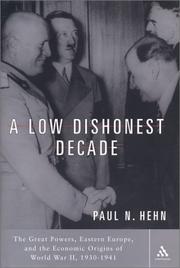- Format
- Book
- Author/Creator
- Hehn, Paul N.
- Published
- New York : Continuum, 2002
- Locale
- Europe, Eastern
Europe
- Contents
-
The trade wars of the 1930s: the struggle for market share and hegemony
Italy, the powers and Eastern Europe, 1918-1939, Mussolini, prisoner of the Mediterranean
France and Poland, 1918-1939. Poland: French or German satellite?
The search for raw materials: Nazi Germany's imperialist plans for the exploitation of southeastern Europe in the inter-war period
An euphoric dream: Grossraumwirtschaft, Lebensraum and British indecision before Nazi Germany's surge for world power
British-German trade problems. Britain threatens a clearing. Schacht's last tape: his unsuccessful attempt to gain raw materials
Trade rivalries in the 1930s. The Foreign Office debate on whether to keep Germany lean or fat. Britain abandons the southeastern trade
Schizoid British views of Nazi Germany: German moderates or German radicals. "Will nasty Mr. Hyde eat poor Dr. Jekyll?"
On the eve. German raw material shortages. "No butter, no eggs, but a new Reich Chancellery." British and French intimations of German collapse
Germany as trading partner in southeastern Europe: exploiter or godsend?
Germany seeks new markets and some old ones. The Czech-German trade struggle in southeastern Europe
The second phase of Nazi attempts to dominate Eastern Europe
The great power struggle for hegemony in southeastern Europe, 1935-1940. Erosion of the little entente and Balkan entente
German encirclement fears. The British guarantee to Poland, Romania and Greece, March-April 1939. U.S. trade relations with Germany and Britain
"Keeping the pot boiling" in Eastern Europe. Anglo-Romanian relations and the Leith-Ross trade mission to Romania in April 1939. Erosion of the Munich Settlement and German-British economic conflict in the Balkans
The period of retarded German hegemony in southeastern Europe, October 1939-October 1940. The Polish campaign to Italy's attack on Greece
Prince Paul, the man in the cage with the tiger. The March 27, 1941 Belgrade Coup, Prince Paul, the British and the Germans.
- Notes
-
Includes bibliographical references (p. 465-485) and index.
The trade wars of the 1930s: the struggle for market share and hegemony -- Italy, the powers and Eastern Europe, 1918-1939, Mussolini, prisoner of the Mediterranean -- France and Poland, 1918-1939. Poland: French or German satellite? -- The search for raw materials: Nazi Germany's imperialist plans for the exploitation of southeastern Europe in the inter-war period -- An euphoric dream: Grossraumwirtschaft, Lebensraum and British indecision before Nazi Germany's surge for world power -- British-German trade problems. Britain threatens a clearing. Schacht's last tape: his unsuccessful attempt to gain raw materials -- Trade rivalries in the 1930s. The Foreign Office debate on whether to keep Germany lean or fat. Britain abandons the southeastern trade -- Schizoid British views of Nazi Germany: German moderates or German radicals. "Will nasty Mr. Hyde eat poor Dr. Jekyll?" -- On the eve. German raw material shortages. "No butter, no eggs, but a new Reich Chancellery." British and French intimations of German collapse -- Germany as trading partner in southeastern Europe: exploiter or godsend? -- Germany seeks new markets and some old ones. The Czech-German trade struggle in southeastern Europe -- The second phase of Nazi attempts to dominate Eastern Europe -- The great power struggle for hegemony in southeastern Europe, 1935-1940. Erosion of the little entente and Balkan entente -- German encirclement fears. The British guarantee to Poland, Romania and Greece, March-April 1939. U.S. trade relations with Germany and Britain -- "Keeping the pot boiling" in Eastern Europe. Anglo-Romanian relations and the Leith-Ross trade mission to Romania in April 1939. Erosion of the Munich Settlement and German-British economic conflict in the Balkans -- The period of retarded German hegemony in southeastern Europe, October 1939-October 1940. The Polish campaign to Italy's attack on Greece -- Prince Paul, the man in the cage with the tiger. The March 27, 1941 Belgrade Coup, Prince Paul, the British and the Germans.




